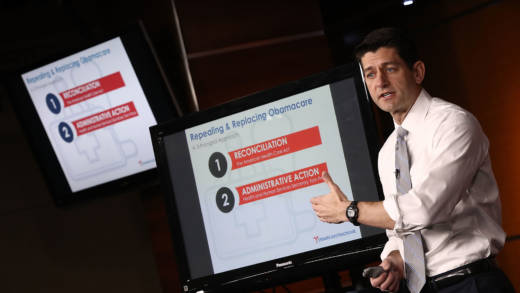The Congressional Budget Office has released a report on the potential impact of the House GOP health care bill. It estimates that the bill would reduce the federal deficit by $337 billion between 2017 and 2026. It also estimates that compared with current law, 14 million more people would be uninsured by 2018, and 24 million more would be uninsured by 2026.
Just over 28 million Americans were uninsured in the first half of 2016, according to the latest data from the Census Bureau. The CBO estimates that in 2026, there would likewise be 28 million uninsured Americans if the current healthcare laws remained in place. However, 52 million would be uninsured under the Republican repeal and replace plan thus far, also known as the American Health Care Act.
Much of the initial spike in uninsured Americans would come from repealing the individual mandate.
"Some of those people would choose not to have insurance because they chose to be covered by insurance under current law only to avoid paying the penalties, and some people would forgo insurance in response to higher premiums," the CBO wrote.
But overall, a big chunk of that increase in the uninsured comes from Medicaid, as the Republican bill rolls back the Affordable Care Act's Medicaid expansion. In 2026, 14 million fewer people would be enrolled in Medicaid under the GOP healthcare bill, accounting for half the total increase in uninsured.
